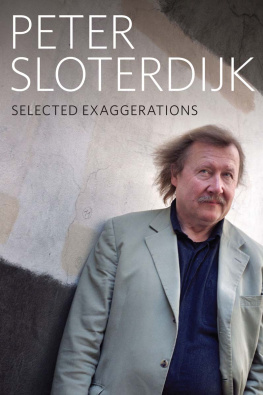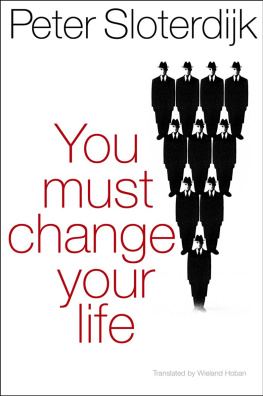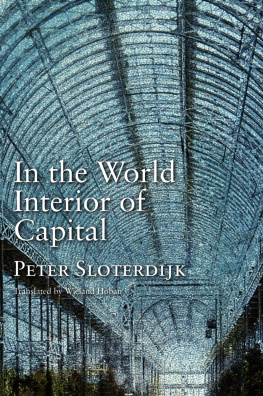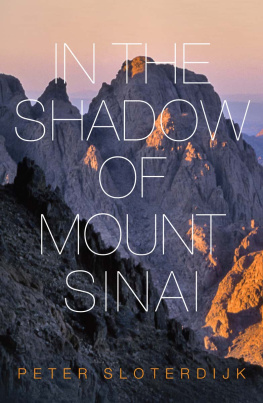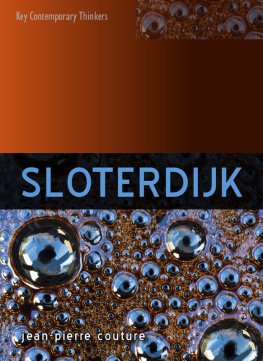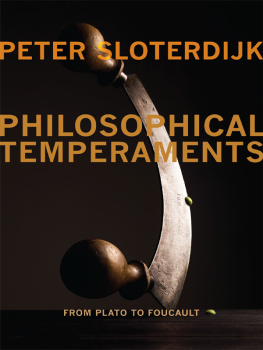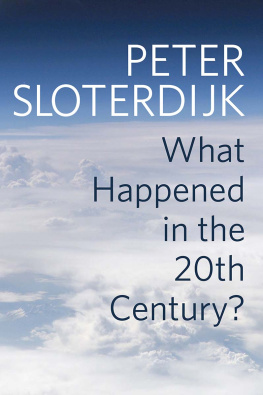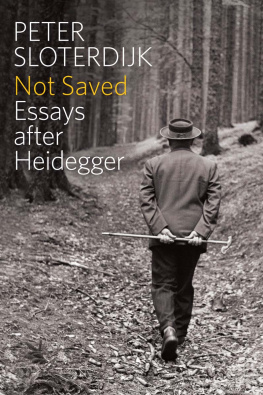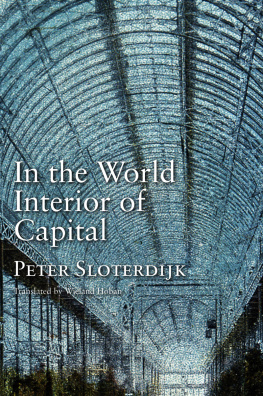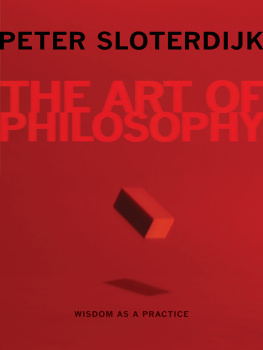Contents
Guide
Pages

Peter Sloterdijk
Selected Exaggerations
Conversations and Interviews 19932012
Edited by Bernhard Klein
Translated by Karen Margolis
polity
First published in German as Ausgewhlte bertreibungen. Gesprche und Interviews
1993-2012 Suhrkamp Verlag, Berlin, 2013
This English edition Polity Press, 2016
Polity Press
65 Bridge Street
Cambridge CB2 1UR, UK
Polity Press
350 Main Street
Malden, MA 02148, USA
All rights reserved. Except for the quotation of short passages for the purpose of criticism and review, no part of this publication may be reproduced, stored in a retrieval system, or transmitted, in any form or by any means, electronic, mechanical, photocopying, recording or otherwise, without the prior permission of the publisher.
ISBN-13: 978-0-7456-9169-5
A catalogue record for this book is available from the British Library.
Library of Congress Cataloging-in-Publication Data
Names: Sloterdijk, Peter, 1947- author.
Title: Selected exaggerations : conversations and interviews, 1993-2012/Peter Sloterdijk.
Description: English edition. | Malden : Polity, 2016. | Includes bibliographical references.
Identifiers: LCCN 2015024410| ISBN 9780745691657 (hardback) | ISBN 9780745691664 (pbk.)
Subjects: LCSH: Sloterdijk, Peter, 1947---Interviews. | Philosophers--Germany--Interviews. | Philosophy, German--21st century.
Classification: LCC B3332.S254 A5 2016 | DDC 193--dc23 LC record available at http://lccn.loc.gov/2015024410
The publisher has used its best endeavours to ensure that the URLs for external websites referred to in this book are correct and active at the time of going to press. However, the publisher has no responsibility for the websites and can make no guarantee that a site will remain live or that the content is or will remain appropriate.
Every effort has been made to trace all copyright holders, but if any have been inadvertently overlooked the publisher will be pleased to include any necessary credits in any subsequent reprint or edition.
For further information on Polity, visit our website:
politybooks.com
Bernhard Klein in conversation with Peter Sloterdijk
Karlsruhe, 17 December 2012
KLEIN: Mr Sloterdijk, after extensive research I have compiled a selection of your interviews over the past two decades, a very compact selection from an enormous wealth of material, but still a weighty volume. I am aware that interviews are only a small part of your publishing activity the phrase tip of the iceberg is very apt here. You have more than forty books to your name, and have also written a large number of essays for a wide range of newspapers, periodicals and anthologies. You have held professorships in Karlsruhe and Vienna for the past twenty years, and you only resigned from the position in Austria quite recently. Aside from this you have had a full timetable as a speaker at all kinds of events, and you have participated in numerous conferences, conventions and symposia. You have given readings from your latest books, and held seminars, ceremonial addresses and after-dinner speeches. You have done interviews in many media and for over ten years you moderated your own TV programme.
According to the general wisdom, less is more. Why, in your case, is more more? Does your almost frantic creative energy express something of the powerlessness every writer feels when faced with the silence of the library?
SLOTERDIJK: I think the real answer to the question of the main impetus for my work is connected more to an inner state rather than an actual motive. Looking back over the years these interviews cover, my first impression of myself is defencelessness, or the ability to be enticed. The clich of the born writers endogenous, ebullient productivity certainly doesnt apply to me, and nor does the model of committed literature. What people see as productivity in my case is usually only my inability to defend myself against suggestions from other people. It starts from a degree of over-compliance. This is ultimately responsible for the constant transition from passivity to production. But this state would not be sustainable without some cockiness. If I took on an additional task, it meant I was prepared to say I could manage that. In the process I sometimes got exhausted, of course, but that was superseded by an incredibly reckless trust in my powers of regeneration. That, incidentally, is the only difference worth mentioning between my earlier life and the present: for a while now, I have noticed that regeneration demands its own time.
KLEIN: Take us into your creative workshop. Can you describe your working technique and explain how you organize your library? How do you remember things?
SLOTERDIJK: Nobody can really know how his memory works. I only know I must have a well-organized internal archive even if it might seem chaotic to other people. My inner archivist finds access to the important files fairly regularly. He is one collaborator who has never disappointed me. He fortuitously retrieves documents I didnt even know had been filed ready for reference. Sometimes he unwittingly discovers nearly finished pieces of writing that I only have to copy up.
KLEIN: To what extent does your relation to language enhance your zest for writing and publishing?
SLOTERDIJK: Language is generally seen as a medium for understanding an assumption that writers shouldnt accept unquestioningly. A critical minority sees language as the starting point of all misunderstandings. Wittgenstein even thought that philosophical problems arose when language goes on holiday although he didnt reveal to us what he meant by going on holiday. Does it mean being nonsensical? Or poring over pseudo-problems, firing excessive volleys into the air? Anyway, he toyed with the idea that one could just as well do without language; the deflationary tendency is clearly evident. Reading that, I can imagine a wrinkled janitor entering the scene who wants to put an end to the silliness of youth. Statements like that seem narrow to me. You really dont know what might happen if you get involved in going on holiday. I prefer the opinion of Wittgensteins fellow Austrian, Egon Friedell, who said: Culture is a wealth of problems. We can try to economise on everything, but not on problems.
KLEIN: So far I have managed to trace around 300 of your interviews in various newspaper archives and on the Internet. Staying with the iceberg image, if we present over thirty selected pieces in this book, this is indeed only the part of the iceberg visible above water. What role do the interviews play in your work as a writer and media personality? Are they there to promote the management of your own name, as you yourself once expressed it?
SLOTERDIJK: You know, some highly reputable authors never gave interviews, and some did so only rarely. But there are others who accept interview proposals easily. I count myself among the latter. It involves brand-name management, and that is an offshoot one accepts. With most interviews the reader will notice that even if I thought about that aspect beforehand, I forgot it after a minute at most. The interview is one form of literary production among others, and I see it as a subgenus of the essay. I have practised it frequently since the time I overcame my reluctance and accepted the role of public intellectual that ensued from my first publications. As you can see, I enjoy formulating things and making propositions, and once I am immersed in the flow of speech I stop worrying about the effect. My worries only become acute in the reworking phase. Im sensitive about failed expressions.

